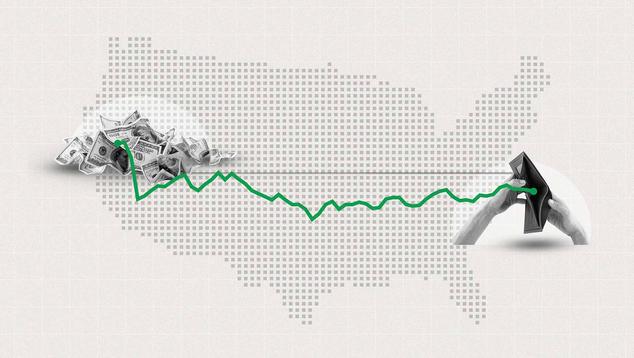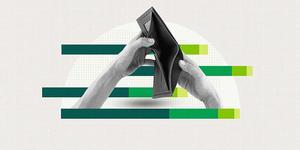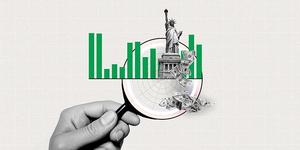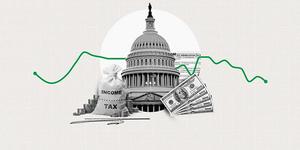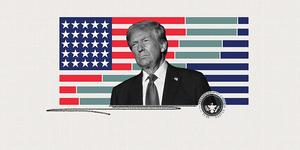Story Highlights
- Consumers’ high hopes for stock market and economy have turned negative
- Majority of Americans now think it’s a bad time to find a quality job
- Partisans have opposing predictions for where economy will be in one year
WASHINGTON, D.C. — Several measures of Americans’ economic mood, including their perceptions of the U.S. economy and their own finances, have weakened in April compared with their prior readings — in some cases, substantially.
Most notably, since January, Americans’ six-month outlooks for economic growth and the stock market have turned from positive to negative, while their forecasts for inflation, interest rates and the job market have dimmed.
In line with those changes, Gallup’s yearly reading on Americans’ assessment of their personal finances shows a record-high 53% now believing their situation is getting worse. This marks the first time in the trend dating back to 2001 that a majority have expressed financial pessimism.
Despite these changes, Gallup’s Economic Confidence Index has held steady, with April’s -22 score not meaningfully different from March’s -20 and January’s -19, though it is down from a -14 reading in December.
These findings come from Gallup’s annual Economy and Personal Finance survey, conducted April 1-14. Most of the poll was conducted after President Donald Trump announced what he termed “Liberation Day” tariffs on numerous countries on April 2. The market subsequently experienced significant volatility, resulting in 4% to 5% declines in the major stock indices over the two-week survey period.
Exuberance Over Stock Market, Economic Growth Fizzles
The latest poll updates Americans’ six-month forecasts for several aspects of the economy, last measured in January. Optimism is down on all five, but particularly for the stock market and economic growth.
Americans have gone from being mostly positive about the direction of the stock market and economic growth in the days after Trump took office to being pessimistic, on balance, today.
- Just 29% now expect the stock market to go up over the next six months, while 58% think it will decline. This is a near reversal from late January, when 61% foresaw the market gaining and 18% declining.
- Similarly, 38% are currently optimistic about U.S. economic growth, predicting it will increase over the next six months, while 48% think it is likely to decline. This differs from the strongly positive tilt in January, when 53% believed economic growth would rise and 29% thought it would decline. Americans were already predicting inflation would increase — as they typically do — in January, but that has risen 11 percentage points to 63%. The public has gone from having mixed expectations for interest rates and unemployment in January to tending to believe these will go up, now at 42% and 47%, respectively.
In further evidence that perceptions of the job market have soured, a majority of 58% now believe it’s a bad time to find a quality job, whereas 38% consider it a good time. This is a change from January, when the public was split between calling it a good time (48%) and a bad time (45%).
This is the most pessimistic outlook for jobs that Gallup has recorded in four years, since January 2021, when the nation was still experiencing high unemployment related to the COVID-19 pandemic.
Record High Say Financial Situation Is Getting Worse
Americans’ assessment of their current financial situation is the same today as a year ago, but their perception of the direction in which their finances are going has worsened.
Ten percent of U.S. adults rate their current financial situation as excellent, 34% call it good, 37% only fair and 18% poor. While those figures are all within a point of last year’s ratings, they are subpar historically. The average percentage of Americans calling their personal finances excellent or good since 2001 is 50%, with positive perceptions peaking at 57% in 2021.
Meanwhile, consumers’ outlook for their finances is the most negative on balance since Gallup began tracking this measure in 2001. A record-high 53% now say their financial situation is getting worse, exceeding the 38% saying their finances are improving by 15 points.
There have been only a few periods in Gallup’s trend that consumers' pessimism about their finances has significantly exceeded optimism. One was in the economically challenged period during and after the 2007-2009 recession; another was at the start of the COVID-19 pandemic in 2020, and the other was from 2022 to 2023 amid high inflation.
At all other times, Americans have been more likely to think their finances are improving than deteriorating.
The six-point increase over the past year in those saying their finances are worsening has occurred about equally across household income groups as well as among stock owners and those who do not own stock.
Following the expected partisan pattern that occurs when the party of the sitting president changes, Republicans’ pessimism about their finances has mostly vanished now that Trump is back in office, falling 40 points from when Joe Biden was president a year ago. At the same time, Democrats’ pessimism has surged, up 55 points. Independents are slightly more pessimistic today than last April, contributing to the negative overall shift.
Economic Confidence Stays at Recent Low
Gallup’s monthly Economic Confidence Index (ECI) is essentially steady in April at -22, reflecting little change in U.S. adults’ ratings of current economic conditions as well as their outlook for the economy.
Longer term, the index has declined by eight points since December. The index score, which has been negative since the start of high inflation in mid-2021, had climbed to -14 in December amid the presidential transition, its highest reading since 2021. But even after worsening since then, this indicator of U.S. economic conditions remains better than was recorded for most of the past four years.
Gallup’s ECI summarizes Americans’ evaluations of current economic conditions (as excellent, good, only fair or poor) and their outlook for the economy (whether they believe it is getting better or getting worse).
The index has a theoretical range of +100 (if all Americans were to rate current conditions as excellent or good and say the economy is getting better) to -100 (if all Americans were to rate the economy as poor and say it is getting worse). In Gallup’s trend of these measures since 1992, the highest ECI score is +56, in January 2000, and the lowest is -72, in October 2008.
Three in Four Americans Believe the Economy Is Faltering
Other questions in the April poll ask Americans where the economy stands on the standard business cycle and where it will be in a year.
A quarter of Americans believe the economy is currently growing, 33% perceive it’s slowing down, and 42% say it is in a recession (27%) or economic depression (15%).
Attitudes are more positive about where the economy will be a year from now, with 45% predicting it will be growing by that time and fewer thinking it will be slowing down (7%). However, the percentage expecting the economy to be in a recession or depression (47% combined) is slightly larger than the 42% saying that about the current economy.
Gallup has asked this question periodically since 2008, including most recently in 2019. Across the limited trend, the most positive evaluation was recorded in January 2019, midway through Trump’s first term, when 41% said the economy was growing and only 17% thought it was in a recession or depression. The least positive was in September 2008, during the global financial crisis, when 3% said it was growing and 69% believed it was in a recession or depression.
Americans’ outlook for the economy has varied less, historically, with more forecasting growth than a recession or depression. This year’s reading is the first time that more than a third think the economy will be in a recession or depression in a year’s time — and the first time that the combined figure for those two negative predictions (now 47%) matches the percentage expecting the economy to be growing.
Republicans Have High Hopes for the Economy; Democrats Predict Contraction
Republicans, including independents who lean Republican, are divided on the health of today’s economy. Forty-nine percent say it is growing, whereas 48% think it is either slowing down (25%), in a recession (15%) or in a depression (8%). By contrast, the vast majority of Democrats and Democratic-leaning independents already believe the economy is slowing down (40%), in a recession (39%) or in a depression (17%), with very few saying it’s growing (3%).
Looking to the future, however, most of Republicans’ hesitancy about economic conditions fades, as 82% say the economy will be growing a year from now. Democrats, on the other hand, foresee an even more difficult economic future, with fewer thinking it will be slowing down and nearly eight in 10 predicting a recession (41%) or depression (35%).
Bottom Line
Public attitudes about several specific aspects of the U.S. economy have changed markedly in the short time Trump has been in office, as Americans’ expectations for the stock market, economic growth and employment have turned negative and consumers are feeling unusually pessimistic about their personal finances.
This has occurred against the backdrop of Trump’s shifting tariff policies and an emerging trade war with China that has roiled the stock market. The administration has argued that higher prices and declining stock values are essentially short-term medicine necessary for remaking the American economy as a financially secure manufacturing giant, promising a strong economy will follow. Most Republicans seem to have faith in that plan, while Democrats are beyond skeptical, with most foreseeing economic pain or collapse.
To stay up to date with the latest Gallup News insights and updates, follow us on X @Gallup.
Learn more about how the Gallup Poll Social Series works.
View complete question responses and trends (PDF download).
